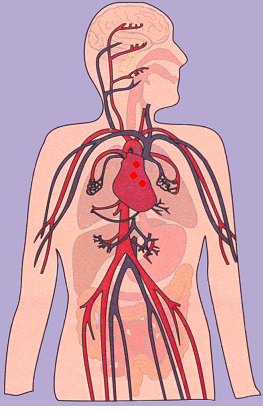
Stress levels can range from minor incidents that occur once in a while to chronic stress which occurs on a daily basis. So what causes chronic stress? Those who experience it are much more likely to have it affect their physical health, which is ironically accompanied by even more stress. This does not mean that the physical symptoms that derive from stress aren’t real; though many claim symptoms may be “all in your head.” These people are wrong. There are several health problems that can occur immediately or slowly progress over time due to chronic stress.
Let’s go through the most common health issues relating to stress.
1. HIGH BLOOD PRESSURE

High blood pressure causes the heart to beat at a faster rate due to excessive stress placed on the organ. This can either be temporary or a long-term condition for some. High blood pressure can be managed by engaging in physical activity regularly, or in more serious cases, be prescribed medication. By avoiding an overconsumption of processed foods, and alcohol, you can help manage high blood pressure spikes and also decrease your risk for stroke.
2. CHANGES IN BRAIN FUNCTION

Similar to the heart, the brain is one of the most significant organs in the body, and its role on our physical and mental health should not be taken lightly. It is essential to keep our brain functioning properly by avoiding injuries to the skull as much as possible. Sadly, chronic stress causes the brain to become vulnerable to memory loss, losing brain cells, and depression. We can prevent this by maintaining an overall healthy lifestyle, including practicing meditation and consuming vitamins daily. As well as choosing to eat foods high in antioxidants, such as blueberries, vegetables, green tea, and even dark chocolate. Who knew chocolate would be the answer to our problems? Things are looking up.
3. INDIGESTION

Many are unaware that the autonomic nervous system lies within the gut, which means that stress affecting the brain also affects a gut’s ability to function. Unfortunately for us, when we feel stressed or anxious, we feel it in our gut, literally. An anxious stomach leads to several problems including cramping pain, nausea, heartburn, and horrible indigestion. People who suffer from IBS, which stands for irritable bowel syndrome, understand the brain-gut connection all too well. This is because any stress to the body at all can cause painful and uncomfortable symptoms in the gastrointestinal tract. If you have an irritable stomach, start taking one probiotic every day, this will bring good bacteria into the gut, which fights off any bad bacteria lingering. Another way to heal the gut is to introduce anti-inflammatory foods into your diet, such as dark vegetables, ginger, turmeric, and lemon. All these foods provide amazing benefits for your gut and overall health.
4. WEAK IMMUNE SYSTEM

If you find yourself having frequent colds or infections you may have a weak immune system. Our immune system was created in order to combat diseases and viruses, which is why it is critical to building a strong immune system. When we experience long-term stress, our immune system shuts down and becomes inflamed, which makes us prone to harmful bacteria. Surprisingly to some, it is quite easy to keep your immune system healthy by simply getting enough sleep, eating nourishing foods and of course, washing our hands.
5. HAIR LOSS

You’ve probably noticed that in certain movies stress can cause a woman’s hair to fall out. Well, sadly this crisis on the big screen is actually quite common in the reality. There are many aspects that can contribute to hair loss, including low iron levels, a hormonal imbalance, or by using hot styling products too often. If you find that none of these factors are relevant and you still notice you are losing large amounts of hair, stress may be the culprit. So what can we do? Include more protein into your diet, this will assist in hair growth because your hair needs protein to remain strong and healthy. Otherwise, if you neglect your protein intake your hair will be starving for nutrients and will start to fall out. Also, taking vitamin A supplements can cause hair to shed because the dosage is too high for our bodies, instead we can receive vitamin A through foods such as sweet potatoes, carrots, kale, and fish. If your hair loss continues to progress, consult with your family doctor.
In reality, these physical symptoms aren’t likely to subside unless you start to manage your stress. Yes, I know what you’re thinking. Easier said than done.
Still, there are small changes you can make in your everyday routine to help you handle stress efficiently. Some believe that medication can improve their health symptoms caused by stress, but in fact, medications may only work as a temporary fix. If you are experiencing painful symptoms that are due to chronic stress you can benefit from counseling, meditation, breathing exercises.
Many find that participating in an activity that they enjoy personally can help take their mind off of stress. Let’s not forget the little things that help de-stress our lives, including laughing and spending time with friends. Not everything is in our control, once we let go of that idea, we will be free from feeling overwhelmed.
Featured image via Ivan Oboleninov on Pexels


















